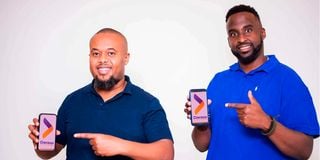Premium
Duo develops digital tool to help teachers set CBC exams

Darasa app co-founders Chris Kamande and Brian Gacari display the app as it loads on their phones.
What you need to know:
- Darasa app gained popularity during the Covid-enforced closure of schools in Kenya.
- Firm’s co-founders excited to have created a product which resonates with the market.
After the Covid-19 pandemic struck in 2020, two friends, Chris Kamande and Brian Gacari, came together to launch a digital product to facilitate the continuation of learning in the midst of school closures.
The product, dubbed Darasa app, would incorporate different learning content such as animated videos on various subjects, life and career talks and live classes by teachers from some of the country’s top schools.
The innovation could not have come at a better time, allowing students to continue with their learning despite the restriction of movement that was put in place to contain the spread of Covid-19 virus.
As a result, it quickly gained popularity, with over 5,000 students using it for learning by the end of 2021.
However, when the lockdown restrictions were lifted in 2022 and the educational calendar returned to normal, the number of students using the platform dropped significantly as schools resumed normal operations.
They therefore shifted their focus to developing a school management system, as well as a tuition system, in partnership with teachers from national schools to educate learners.
“The platforms did well but the challenge was that when schools reopened, again there was a drop. For us to remain relevant, we would have to go back to the drawing board,” said Kamande, co-founder of Darasa in an interview with Powering SMEs.
In their previous interactions with the teachers they had worked with on the learning system, one of the things teachers had indicated they struggled with was getting quality exams.
“If I’m a teacher, I can’t get a textbook with 100,000 questions, it’s impossible, but on a phone it’s easy to access a digital database with more questions,” Kamande said.
So in 2023, they moved from providing learning content to offering assessment content that would enable teachers to set quality exams or homework for their students based on the new CBC curriculum.
At a fee of Sh20 per assessment downloaded, the application would grant teachers access to more than 100,000 categorised questions, with 1,000 new questions being uploaded daily to the system.
“Teachers struggle to quickly assess students’ understanding, provide personalised feedback, and make data-driven decisions. Current assessment methods are often time-consuming, subjective, and lack the insights needed to truly optimise learning,” said Brian Gacari, co-founder of Darasa app.
The team had put in a lot of work into making sure that the product matched the market needs and while it did, there was a problem. Many of the teachers they targeted were not aware of the product.
Those who eventually became aware of the product were at first a bit hesitant in using it, either because they were not tech-savvy, or just used to the old way of doing things.
“When we started this journey in 2020, we thought that in six months, we would be the Elon Musk or Zuckerberg of education, running the biggest digital school. We had very wrong assumptions about how long it actually takes to build a product,” offered Gacari.
Having already invested Sh2 million into the business, they however kept going until they would start to generate a return on investment. Their efforts finally began to pay off, when some of the teachers who used their platform, began referring them to other teachers.
“Having worked in the tech sector in other parts of Africa including West Africa, I have come to understand why they call Kenya the Silicon Savannah. Kenyans are genuinely tech savvy,” said Kamande.
As the number of users grew, they had to increase their workforce from less than five to 12, in order to be able to handle the growing workload.
“We incorporated more developers, a content team to help us upload the questions and ensure they were well categorised, a project manager and an accountant,” explained Kamande.
The firm’s co-founders say they are very excited to have finally created a product which resonates with the market, after four years of trial and error.
“It now makes sense why we have very few digital systems in Africa and Kenya, because it is a very difficult process to get that market fit, some tech companies globally can take up to six years to get the market fit,” says Kamande.
Their dream is to expand even further, venturing into other markets so that everyone around the world can use the product to set assessments in their respective countries and curricula.
“At the moment, we are all meeting online. Because of technology, we are not limited by space. We want to use the same technologies like artificial intelligence to empower content and reach more people,” offers Gacari.
On Darasa app, students can access content categorised in topics and sub-topics of the 8.4.4 system for high school, and strands and substrands for CBC system, at daily subscription fee of Sh99, weekly subscription fee of Sh159 or monthly subscription fee of Sh999.





